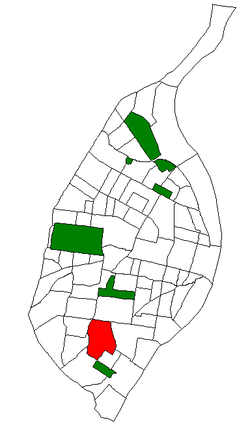Bevo Mill, St. Louis
Bevo Mill | |
|---|---|
 Bevo Mill, the namesake of the neighborhood | |
 Location (red) of Bevo Mill within St. Louis | |
| Country | United States |
| State | Missouri |
| City | St. Louis |
| Wards | 13, 14 |
| Area | |
| • Total | 1.37 sq mi (3.5 km2) |
| Population (2020)[1] | |
| • Total | 11,941 |
| • Density | 8,700/sq mi (3,400/km2) |
| ZIP Code | Part of 63116 |
| Area code | 314 |
Bevo Mill is a neighborhood located in south St. Louis, Missouri.
Populace
[edit]The Bevo Mill area is direct to the west of the neighborhood of Dutchtown, which was a major center of German settlement in St. Louis in the mid-nineteenth century. After significant population loss in the later twentieth century, the neighborhood was revitalized in the 1990s by immigrants fleeing war in Bosnia and Croatia. Today, much of the Bevo Mill neighborhood is populated with immigrants, particularly Bosnian Americans and Croatian Americans. The St. Louis metro area is now home to an estimated 50,000 Bosnians. [2] The influx of new immigrants has helped stem the decline in St. Louis's population.[3] Many Bosnians have purchased homes in South St. Louis, starting new businesses, including bakeries, cafes, taverns, nightclubs, restaurants, neighborhood grocery stores, and butcher shops, stimulating the economy[4] and transforming the area, once known for crime, into a safe, thriving neighborhood.[5]
Bevo Mill Restaurant
[edit]The neighborhood was named after the Bevo Mill, a distinctive restaurant with a windmill and beer hall at Gravois and Morganford roads. The restaurant was opened by August Busch Sr. in 1917 who wished to recreate a European beer garden where drinks would be served in an outdoor atmosphere of music and dancing, like a country club in the City. Busch toured Holland for a year prior to the mill´s erection, seeking authentic artifacts and studying Dutch windmills. A famous feature of Bevo Mill are its porcelain tile murals of idyllic scenes. They were made in Germany about 1890. It is said that Busch paid Tony Faust $50,000 for them after the closing of Faust´s downtown restaurant in 1916.[6] Architects Klipstein and Rothman designed the mill in a Tudor revival style. Bevo Mill is named for a malt beverage that was produced by Anheuser-Busch at the time of the Mill's opening.
The Mill became a City Landmark in 1971 and is located at 4749 Gravois. It was built by Grone Construction, owned by Louis Henry Grone whose cousins owned H. Grone Brewery.[7] It operated under the name Bevo Mill until its closure in 2009.[8] In 2017, a restaurant and event venue named Das Bevo opened at the location. The restaurant and venue remain in operation today with a weekend dining schedule.[9]
Demographics
[edit]| Census | Pop. | Note | %± |
|---|---|---|---|
| 1990 | 13,179 | — | |
| 2000 | 13,286 | 0.8% | |
| 2010 | 12,654 | −4.8% | |
| 2020 | 11,941 | −5.6% | |
| Sources:[10][11] | |||
In 2020, Bevo Mill's racial makeup was 58.3% White, 20.6% Black, 0.6% Native American, 4.8% Asian, 9.9% Two or More Races, and 5.7% Some Other Race. 11.6% of Bevo Mill's population was of Hispanic or Latino origin.[12]
See also
[edit]- Holly Hills, St. Louis, southeast of Bevo
- History of Bosnian Americans in St. Louis
- Peter Mathews Memorial Skate Garden
References
[edit]- ^ "2020 Census Neighborhood Results".
- ^ Angle, Third (2020-10-29). "Bosniaks in North America Infographic". Global Gates. Retrieved 2023-06-10.
- ^ Preston, Julia (15 April 2010). "Work Force Fueled by Highly Skilled Immigrants". New York Times. Retrieved September 30, 2011.
- ^ Tucci, Linda (11 April 1999). "Refugees Revitalizing City Neighborhoods". St. Louis Business Journal. Retrieved September 30, 2011.
- ^ "How Muslim refugees from Bosnia transformed a corner of the Midwest". The Economist. 19 December 2015. Retrieved 22 December 2015.
- ^ "St. Louis Historic Preservation".
- ^ "Lost Tables: Bevo Mill". www.losttables.com. Retrieved Apr 21, 2021.
- ^ "Bevo Mill closes".
- ^ Fenske, Sarah. "Das Bevo Closes Its Kitchen, Planning a New Future as Event Host". Riverfront Times. Retrieved Apr 21, 2021.
- ^ "Bevo Mill Neighborhood Statistics". St Louis, MO. Retrieved 26 January 2023.
- ^ "Neighborhood Census Data". City of St. Louis. Retrieved 26 January 2023.
- ^ "City of St. Louis" (PDF). Retrieved 2021-09-16.
External links
[edit]- Bevo Mill Neighborhood on stlouis-mo.gov
